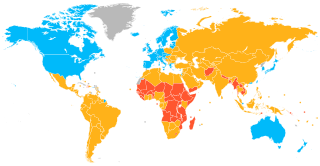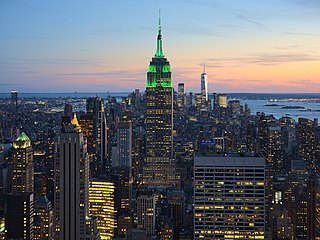Related Research Articles

The economy of Kazakhstan is the largest in Central Asia in both absolute and per capita terms. Kazakhstan has attracted to 2021 more than US$370 billion of foreign investments since becoming an independent republic after the collapse of the former Soviet Union.

The economy of Poland is an industrialized, mixed economy with a developed market that serves as the sixth-largest in the European Union by nominal GDP and fifth-largest by GDP (PPP). Poland boasts the extensive public services characteristic of most developed economies. Since 1988, Poland has pursued a policy of economic liberalization but retained an advanced public welfare system. This includes universal free public healthcare and education, extensive provisions of free public childcare and parental leave. The country is considered by many to be a successful post-communist state. It is classified as a high-income economy by the World Bank, ranking 22nd worldwide in terms of GDP (PPP), 23rd in terms of GDP (nominal), and 23rd in the 2018 Economic Complexity Index.

A developed country, orhigh-income country, is a sovereign state that has a high quality of life, developed economy, and advanced technological infrastructure relative to other less industrialized nations. Most commonly, the criteria for evaluating the degree of economic development are the gross domestic product (GDP), gross national product (GNP), the per capita income, level of industrialization, amount of widespread infrastructure and general standard of living. Which criteria are to be used and which countries can be classified as being developed are subjects of debate. Different definitions of developed countries are provided by the International Monetary Fund and the World Bank; moreover, HDI ranking is used to reflect the composite index of life expectancy, education, and income per capita. Another commonly used measure of a developed country is the threshold of GDP (PPP) per capita of at least USD$22,000. In 2023, 37 countries fit all four criteria, while an additional 16 countries fit three out of four.

A global city, also known as a power city, world city, alpha city, or world center, is a city that serves as a primary node in the global economic network. The concept originates from geography and urban studies, based on the thesis that globalization has created a hierarchy of strategic geographic locations with varying degrees of influence over finance, trade, and culture worldwide. The global city represents the most complex and significant hub within the international system, characterized by links binding it to other cities that have direct, tangible effects on global socioeconomic affairs.

The Environmental Performance Index (EPI) is a method of quantifying and numerically marking the environmental performance of a state's policies. This index was developed from the Pilot Environmental Performance Index, first published in 2002, and designed to supplement the environmental targets set forth in the United Nations Millennium Development Goals.

The ease of doing business index was an index created jointly by Simeon Djankov, Michael Klein, and Caralee McLiesh, three leading economists at the World Bank Group, following the release of World Development Report 2002. The academic research for the report was done jointly with professors Edward Glaeser, Oliver Hart, and Andrei Shleifer. Though the first report was authored by Djankov, Klein, and McLiesh, and they continue to be listed as "founders" of the report, some sources attribute the genesis of the idea to Djankov and Gerhard Pohl. Higher rankings indicated better, usually simpler, regulations for businesses and stronger protections of property rights. Empirical research funded by the World Bank to justify their work show that the economic growth effect of improving these regulations is strong. Other researchers find that the distance-to-frontier measure introduced in 2016 after a decision of the World Bank board is not correlated with subsequent economic growth or investment.
This table contains international rankings of Finland, including previous years when available.
The following are international rankings of Thailand.

Climate change in South Asia is having significant impacts already which are expected to intensify as global temperatures rise due to climate change. The South Asia region consists of the eight countries Afghanistan, Pakistan, India, Nepal, Bhutan, Bangladesh, the Maldives and Sri Lanka. In the 2017 edition of Germanwatch's Climate Risk Index, Bangladesh and Pakistan ranked sixth and seventh respectively as the countries most affected by climate change in the period from 1996 to 2015, while India ranked fourth among the list of countries most affected by climate change in 2015. South Asia is one of the most vulnerable regions globally to a number of direct and indirect effects of climate change, including sea level rise, cyclonic activity, and changes in ambient temperature and precipitation patterns. Ongoing sea level rise has already submerged several low-lying islands in the Sundarbans region, displacing thousands of people.
The following are international rankings of Malaysia.
These are the international rankings of Pakistan.
The following are some international rankings of Singapore.
The following are international rankings of Vietnam.
Australia ranks amongst the highest in the world for quality of life, health, education, economic freedom, civil liberties and political rights.
Canada ranks among the highest in international measurements of government transparency, civil liberties, quality of life, economic freedom, education levels, gender equality, public services, public security and environmental sustainability. It ranks among the lowest of the most developed countries for housing affordability, healthcare services and foreign direct investment.
These are the international rankings of Latvia.
These are the international rankings of the United Kingdom.
The following are international rankings of Israel:

The Good Country Index measures how much each of the 163 countries on the list contribute to the planet, and to the human race, through their policies and behaviors.

Kirsty Gogan Alexander is an entrepreneur and environmentalist advocating for the use of all clean energy sources to address climate change. In 2021, Kirsty was appointed as a member of the IAEA Standing Advisory Group Nuclear Applications (SAGNA). She was awarded the Global Women In Nuclear Special Award For Work On Climate Change (2016), and Nuclear Industry Council Trailblazer Award (2019). She is a Fellow of the Royal Society of Arts, Manufacturing and Commerce. She has also been awarded Honorary Fellowships by the Energy Institute and the Nuclear Institute. Honorary Fellow is a category of membership that recognises those who: “… the Board has decided merit special recognition by virtue of their position in the nuclear industry, their unique expertise or qualification, or in order to recognise their contribution to the industry in other ways.”
References
- ↑ "Climate Change Performance Index". climate-change-performance-index.org. Retrieved 14 January 2019.
- ↑ "Social Progress Imperative". www.socialprogress.org. Retrieved 17 February 2021.
- ↑ "IMD World Talent Ranking". www.imd.org. p. 68. Retrieved 12 November 2020.
- ↑ "Rankings". World Bank.
- ↑ "EF English Proficiency Index – A comprehensive ranking of countries by English skills". Ef.com. Retrieved 15 January 2019.
- ↑ "Global Rankings 2018". World Bank. Retrieved 15 January 2019.
- ↑ "The Network Readiness Index 2019" (PDF). networkreadinessindex.org. Retrieved 17 February 2021.
- ↑ "Data of press freedom ranking 2020 - Lithuania". RSF. 10 March 2022.
- ↑ "BTI 2018. Lithuania Country Report". www.bti-project.org. Retrieved 17 November 2018.
- ↑ "Globe :: Legatum Prosperity Index 2020". Prosperity.com. Retrieved 17 February 2021.
- ↑ "European Innovation Scoreboard Interactive Tool". ec.europa.eu. Retrieved 31 March 2018.
- ↑ "World Happiness Report 2020" (PDF). worldhappiness.report. p. 24. Retrieved 17 February 2021.
- ↑ Global Cybersecurity Index (GCI)2018 (PDF). 2019. p. 11. ISBN 978-92-61-28201-1 . Retrieved 1 April 2019.
- ↑ "Electoral Integrity Worldwide" (PDF). p. 9. Retrieved 7 July 2019.
